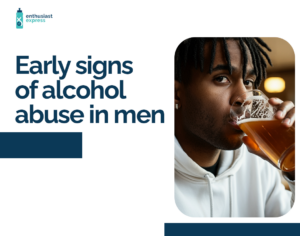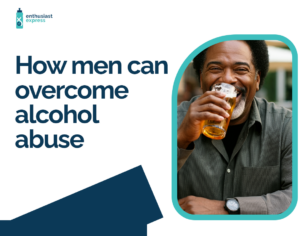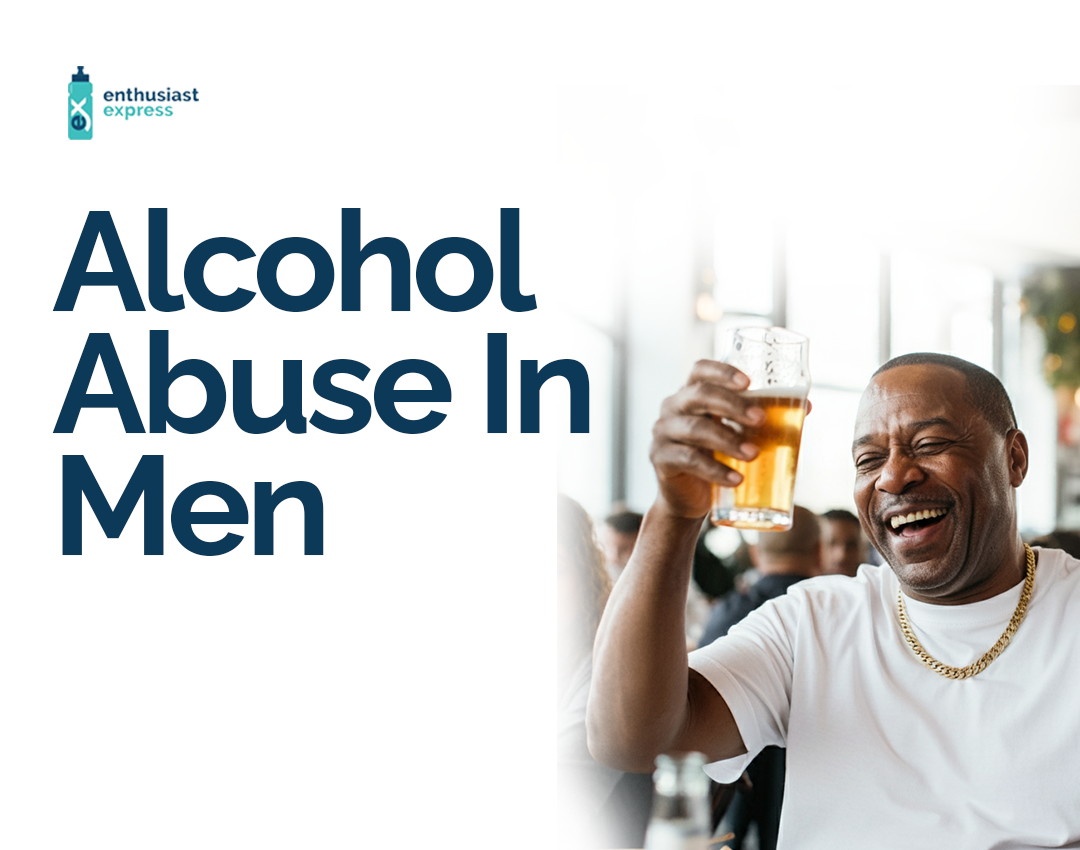Alcohol abuse is a growing problem among men, especially young men in their 30s.
For many men, alcohol seems like a way to unwind, escape stress, or celebrate. But excessive drinking can quickly become a harmful habit.
Alcohol abuse is a growing problem among men, especially young men in their 30s.
Research shows that men are more likely to binge drink and develop alcohol dependence, leading to serious long-term consequences.
What starts as an occasional drink can lead to chronic health problems, strained relationships, and career challenges.
From liver damage to mental health challenges like depression and anxiety, alcohol misuse can take a heavy toll.
In this article, we’ll explore the harmful side effects of alcohol abuse in men and offer insight into how to recognize and prevent it.
5 Harmful Side Effects of Alcohol
Alcohol abuse can have devastating effects on a man’s life, harming both his mental and physical health. It often affects other important areas of their life as well.
Below are five harmful side effects that men often face when alcohol misuse becomes a regular habit.
1. Effects on Mental Health

When you abuse alcohol, it can lead to anxiety and depression. Men who regularly turn to alcohol as an means to escape the stress of daily life may soon find their emotional health deteriorating over time.
Instead of you relaxing, your mind will become more anxious, and since alcohol is used a depressant, it often deepens feelings of sadness.
Memory problems also occur, making it harder to recall important events or even perform day-to-day tasks.
You may think that forgetting simple things or you blanking out on conversations has to do with stress whereas it is the alcohol causing damage to your brain.
2. Liver and Heart Damage
Physically, alcohol puts a heavy burden on the liver, often leading to liver diseases like cirrhosis.
Men who drink heavily might start to feel frequent fatigue or pain in their abdomen, which can be early signs of liver damage.
Your heart is also affected by too much alcohol because not only can alcohol raise your blood pressure, it can also increase the risk of having heart attacks and strokes.
3. Strained Relationships

Alcohol abuse doesn’t only affect the man but also those around him including his own family and friends with people at work too.
When’s man drinks too much alcohol and goes home drunk, it can lead to arguments with family members especially his spouse, causing tension at home.
You may eventually become withdrawn – spending less time with your loved ones, and over time alcohol can lead to isolation, and your relationships with the people you love will start to fall apart because they can’t keep up with your behaviour anymore.
4. Career and Financial Consequences
At work, misusing alcohol can result in poor performance, being absent from work, taking leaves without asking your boss, disrespectful behaviour and even job loss.
A man who can’t focus on his duties at work or misses important deadlines because of a hangover risks his entire career and financial stability.
Losing a job due to alcohol can lead to debts and drain household finances.
5. Long-term Health Risks

In the long run, alcohol abuse increases the risk of serious diseases like cancer, particularly in the liver, throat, and oesophagus.
Men who continue to drink heavily over the years will significantly increase their chances of developing chronic diseases that can be life-threatening.
How Does Alcohol Abuse in Men Start?

Alcohol abuse in men often develops gradually, influenced by social, emotional, and cultural factors.
It usually starts as casual drinking but can escalate into a harmful habit over time.
Let’s explore the common triggers that lead men down this path.
1. Societal Pressures
For many men especially in Nigerian cultures, drinking is associated with socializing. At parties, gatherings, or after-work hangouts, alcohol is often present.
Your fellow men might encourage you to drink more, and in cultures where drinking is celebrated, it’s easy to overindulge.
For instance, if you initially enjoyed a beer or two with friends before, you might start drinking more beers regularly just to keep up with social norms or fit in with your peers.
Over time, this social drinking can transform into a dangerous daily pattern.
2. Emotional escape from pain or challenges
Men often face pressure to appear strong, and sometimes alcohol can become a tool for dealing with stress or emotional pain.
If you’re probably dealing with difficulties in your career or family issues, you may start using alcohol to “numb” himself from the pain or just to temporarily escape feelings of frustration.
For example, a man that is feeling overwhelmed by financial problems might drink every night to avoid confronting his reality, unknowingly setting the stage for alcohol abuse.
3. Cultural Influences
In some environments, heavy drinking is seen as a rite of passage to manhood or as a sign of masculinity.
Many men who grow up around strong drinking cultures might feel that consuming alcohol is expected of them, which will lead them to overdrink without fully considering the long-term consequences.
What Are the Signs of Alcohol Abuse in Men?

Recognizing the signs of alcohol abuse in men is key to preventing long-term harm. Often, these signs are subtle at first, but they gradually become harder to ignore.
Here are some of the initial red flags men should watch out for.
I. Increased tolerance
One of the earliest signs is needing more alcohol to feel the same effects.
A man who used to feel relaxed after one or two drinks may find himself drinking much more without getting tired, he just wants to keep drinking and drinking.
This increased tolerance is a warning sign that his body is becoming dependent on alcohol.
II. Physical changes like beer belly and boobs
Physical signs like a noticeable beer belly or the development of “man boobs” (gynecomastia) can be indicators of alcohol abuse.
Excessive drinking can also lead to weight gain and hormonal imbalances that affect your appearance.
III. Low libido
Alcohol suppresses the central nervous system which affects blood flow to the penis, and this can make it difficult for some men to get an erection.
Over time, consistent heavy drinking will harm the liver, leading to low levels of testosterone and high levels of oestrogen which can contribute to erectile dysfunction and low sex drive.
IV. Craving alcohol all the time
You may start craving alcohol regularly, thinking about your next drink even during the day.
If alcohol is becoming a constant thought, it is a sign that you are depending on it.
Why Is Alcohol Abuse among Men a serious problem?

Alcohol abuse in men is increasingly becoming a significant health concern.
Understanding why this issue is on the rise can help men recognize the dangers and take proactive steps to address it.
Below are four key reasons why alcohol abuse in men is becoming more serious;
1. Increased Levels of stress
Many men are dealing with rising stress from work, finances, and family responsibilities.
All these pressures can make them use alcohol as a coping mechanism.
For instance, a man who feels overwhelmed by his job or household demands may start drinking regularly to manage stress, without caring about the long-term consequences.
2. Easy Availability of Alcohol
Alcohol is widely accessible, from bars to supermarkets, which makes it easy for men to access and drink it more frequently.
This easy accessibility of alcohol can encourage overconsumption, especially when it is used to cope with emotional or social challenges.
3. Lack of Awareness of Over drinking
Some men do not fully understand the long-term damage that alcohol abuse can cause.
They may not recognize their health is at risk until the problem becomes more serious. By then, it is already harder to reverse the effects of heavy drinking.
4. Alarming Statistics
Statistics show that men are significantly more likely to binge drink than women, highlighting the growing problem.
These studies only shows how widespread and deeply embedded alcohol abuse has become among men.
Can Alcohol Abuse in Men Be Prevented?

Alcohol abuse in men can be prevented with these practical steps and support:
i. Self awareness
One of the first strategies is building self-awareness. Men should recognize when casual drinking is turning into a habit and start to be honest with themselves about their consumption.
Setting limits on alcohol intake or cutting down the number of beer or alcoholic drinks during social events can help maintain control.
ii. Seek Professional Help
If drinking feels hard to manage, reaching out to a healthcare professional or counsellor can make a huge difference. Therapy or support groups can provide guidance and help men develop healthier coping mechanisms when it comes to dealing with alcohol abuse.
iii. Build a Strong Support System
Having a circle of friends and family who encourage healthier habits is important.
When you are surrounded by positive influences, it is easier to avoid situations where alcohol might become what you depend on.
iv. Make Lifestyle Changes
Adopt a healthier lifestyle through regular exercise, hobbies, or stress-relief activities like meditation.
This can reduce the urge to rely on alcohol. Engaging in these activities offers healthier ways to cope with life’s pressures instead of always turning to alcohol.

Conclusion
Alcohol abuse can affect every aspect of a man’s health, from mental well-being to relationships and career.
Awareness is key to prevention, and making changes early can help avoid long-term consequences.
If you’ve noticed any of these signs in yourself or someone close, it’s time to reflect on the role alcohol plays in your life.
Don’t hesitate to seek professional help or lean on your support system if you need it.
______________________
At Enthusiast Express, we’re dedicated to helping men take control of their health and well-being, including their relationship with alcohol.
If you’ve noticed any signs of alcohol abuse affecting your life or the lives of those around you, now is the time to make a change.
Don’t wait to take action. Subscribe to Enthusiast Express for more expert advice on men’s health, including tips on overcoming alcohol abuse and living a balanced lifestyle.
Join our growing community of men who are committed to supporting each other in making healthier choices.

